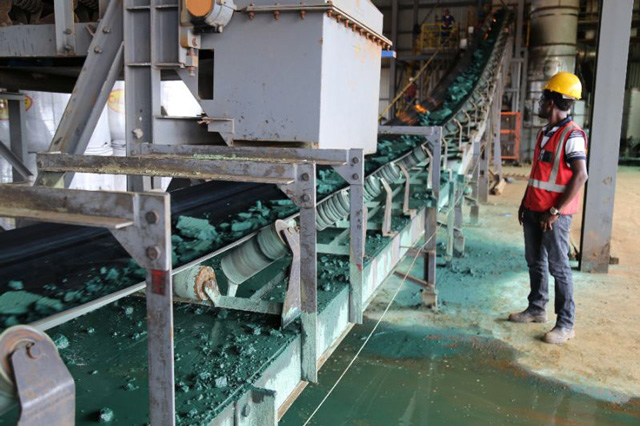
Kinshasa, DR Congo | AFP | The Democratic Republic of Congo’s new leadership is under mounting pressure to diversify the country’s economy from its dependence on raw materials following the plunge in the price of cobalt.
Economic experts currently visiting the country have a sobering figure on which to base their work: over the past year the price of cobalt on the London Metal Exchange has tumbled from $80,000 to $28,000.
The DR Congo is the world’s top producer of cobalt, a key component for rechargeable batteries needed for smartphones and electric cars.
But economic growth in Sub-Saharan Africa’s largest country is on the same roller coaster as the global cobalt price.
“GDP growth increased to 5.8 percent from 3.7 percent in 2017 … driven by a sharp increase in cobalt prices,” the International Monetary Fund said earlier this month in a report of DR Congo’s economy.
“GDP growth is projected to decelerate to 4.3 percent in 2019 based on the assumption of a slowdown in mining activity in the context of lower cobalt prices,” it added.
In another sign of the DR Congo’s heavy reliance on mining and metals exports, that deceleration comes amid growth more than doubling in the rest of the economy thanks to public investment and post-election optimism.
Either way, the DR Congo’s GDP is tiny for the size of the country and its population.
At less than $40 billion for 81 million inhabitants in 2017, according to World Bank figures, that translates into less than $2 per day per person on average.
The IMF mission “focused on policies that would lead to diversifying the economy and tackling high levels of poverty and unemployment in the context of a rapidly expanding population,” according to the report.
Diversification and transformation of the nation’s economy is also the theme of the sixth French Kinshasa week organised by the Franco-Congolese Chamber of Commerce and Industry.
With 80 percent of the DR Congo’s export revenues generated by the mining sector this “creates a vulnerability due to the volatility in the prices of its main raw material exports” noted the organisers.
– Liberalisation –
They said possibilities in numerous other sectors needed to be explored for growth opportunities: agriculture and food, textiles, tourism, communications, transportation services, forestry, energy, pharmaceuticals and recycling.
France is keen to promote an initiative recently unveiled by President Emmanuel Macron to provide 2.5 billion euros ($2.8 billion) in financing to 100,000 African startups as well as small and medium-sized companies by 2022.
But the best intentions in business development must confront the problems of doing business in what is a weak state because of patchy tax revenue collection amidst endemic corruption.
One economic analyst, who spoke on condition on anonymity said “fifty percent of the containers that enter the Matadi river port don’t pay customs duties”.
The IMF urged the new president Felix Tshisekedi “to expedite the adoption of the proposed anti-corruption law” and the creation of an independent anti-corruption commission.
The IMF also expressed concern about low tax collection.
Reforms in some areas are moving ahead, albeit slowly.
The insurance sector has been liberalised with three operators licensed to take over from the former state monopoly Sonas.
And mining multinationals will be meeting in Lubumbashi to discuss the plunge in cobalt prices and the impact last year’s reform of the mining code has had.
Mining expert Chantelle Kotze said the reform increased taxes and royalties paid on strategic minerals such as cobalt and coltan, an ore that is another crucial element for the production of electric car batteries.
 The Independent Uganda: You get the Truth we Pay the Price
The Independent Uganda: You get the Truth we Pay the Price



